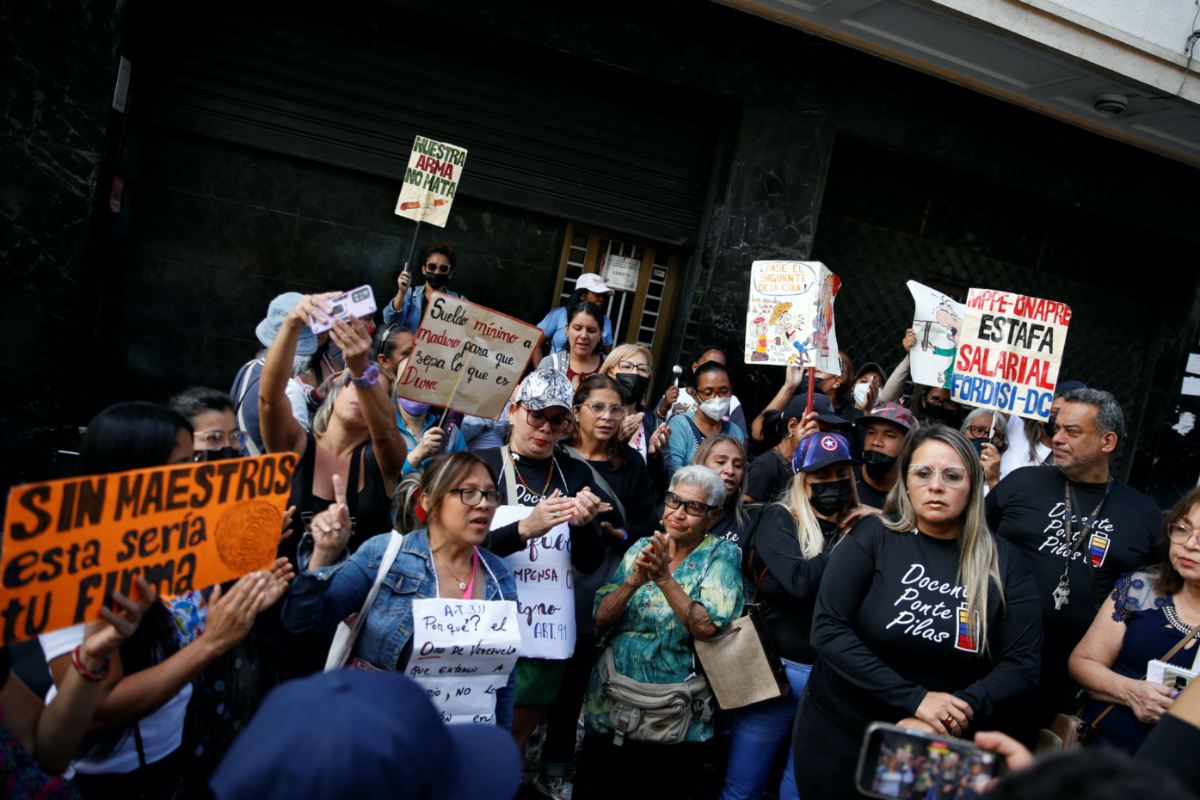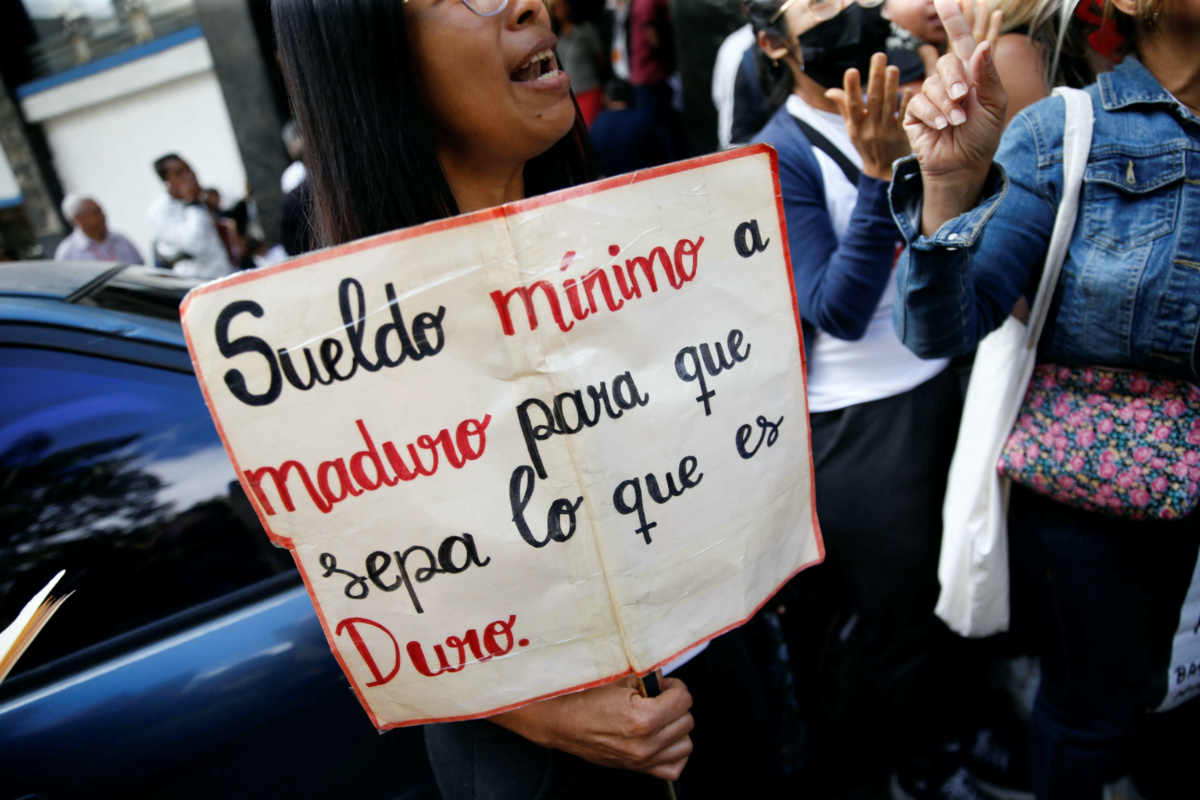Caracas, Venezuela
Reuters
Like many Venezuelans, Carmen Mendoza has learned to get by with a patchwork of different income streams in different currencies – her pension, renting out a property, and roughly $US150 per month her two daughters send from Spain.
But it is no longer enough.

Teachers protest demanding better salaries in Caracas, Venezuela, on 23rd February, 2023. PICTURE: Reuters/Leonardo Fernandez Viloria/File photo.
Resurgent inflation is devouring the income of Venezuelans – even the relatively privileged ones like Mendoza who have access to US dollars.
That is leaving them hungry and struggling to buy food and medicine, they told Reuters.
“Neither dollars or bolivars are enough. I can’t afford anything,” said 68-year-old Mendoza, who lives in Los Teques, the capital of Miranda state.
Hunger is a familiar spectre in Venezuela, which suffered years of hyperinflation in the second half of the last decade, as the government of President Nicolas Maduro printed money to pay its debts amid a slow-down in oil prices.
Many Venezuelans were left to scour through garbage to find food, and millions fled the country to build new lives across South America and beyond.
Maduro relaxed currency controls in 2019, allowing a de facto dollarisation. Combined with orthodox economic policies including limiting the expansion of credit, reducing public spending, and raising taxes, inflation fell to single digits for about a year.
But in late 2022, Venezuela’s consumer price growth began to accelerate sharply. As countries around the world have grappled with rising inflation in the wake of the coronavirus pandemic, Venezuela’s price growth has been spurred by growing demand for dollars, increased government spending, and weakening of the bolivar, prompting fears of a renewed era of hyperinflation.
Prices rose over 37 per cent in December compared to the previous month, according to a non-governmental group of economists who calculate indicators in the absence of official data, and who estimated 2022 inflation at over 300 per cent.
Even Venezuelans who benefited from dollarisation through remittances or salary payments are being hit by the higher prices, while those earning in bolivars have seen their meager earnings decline further.
Since the start of this year, Yaselin Garcia, 32, has watched as groceries bought with the $US20 she makes each week selling cigarettes and other items have dwindled to just 15 eggs, three kilograms of corn flour, some grains and some cheese.
“If I were earning in bolivars I wouldn’t be able to buy anything,” said the mother-of-four in Los Teques.

A teacher holds a sign reading “Minimum wage to Maduro to let him know how hard it is” during a protest demanding better salaries in Caracas, Venezuela, on 23rd February, 2023. PICTURE: Reuters/Leonardo Fernandez Viloria/File photo.
Monthly private sector pay averages $US139 and public sector salaries are around $US14 per month, according to the Venezuelan Observatory of Finances, while the average family grocery shop comes in at some $US370 per month.
“Wage increases are lagging behind,” said economist Asdrubal Oliveros, director of local analyst firm Ecoanalitica. “The purchasing power of salaries paid in dollars has fallen.”
Oscar Iochunga, 66, sells vegetables at a street market in capital Caracas, but is seeing demand fall each week as people limit their purchases.
“Whether you pay in bolivars or dollars it is not enough,” Iochunga said, sitting in front of his stall.
We rely on our readers to fund Sight's work - become a financial supporter today!
For more information, head to our Subscriber's page.
Markets are full of food which few can buy, which pushes people to skip meals or rely on help from charities, said Ania Pulido, a nutritionist at advocacy group the Venezuelan Observatory for Food Security and Nutrition.
Money “which today got you 20 products by tomorrow won’t even get you…half that,” Pulido said.
Some 50 per cent of Venezuelan households live in poverty, according to a national poll carried out by the Universidad Catolica Andres Bello, and 41 per cent of those polled said they skip one meal per day.
For Yusmary Tovar, 42, who cares for her five-year-old daughter and her elderly mother, $US80 in monthly earnings from cleaning houses and babysitting is no longer enough.
Tovar has a kidney problem and must use a catheter to urinate. The catheters’ high cost forces her to boil them in water and reuse them.
“You get ill just thinking about how to make it through one day to the next,” she said.
– Additional reporting by JOHNNY CARVAJAL






